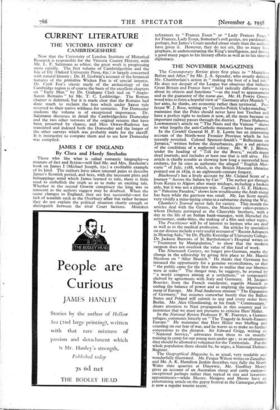THE NOVEMBER MAGAZINES
The Contemporary Review gives first place to " Munich-- Before and After," by Mr. J. A. Spender, who stoutly defends Mr. Chamberlain's action in " making the best of a bad job." He does not despair of the League but observes that hitherto Great Britain and France have " held radically different views about its objects and functions "—as the road to appeasement and as the guarantor of the status quo. Mr. H. Powys Green- wood tries to form a hopeful view of " Germany after Munich " ; her aims, he thinks, are economic rather than territorial. Pro- fessor W. J. Rose, writing on " Czecho-Polish Understanding," maintains that the Poles should never have lost Teschen and have a perfect right to reclaim it now, all the more because an important railway passes through the district. Prince Hubertus Loewenstein's article on " The Nazis and the Vatican " shows to what lengths the anti-Catholic measures have been pressed.
In the Cornhill General H. F. E. Lewin has an interesting account of the North-west Frontier Province which he has recently revisited. Colonel Spencer-Smith's " Reflections on Jamaica," written before the disturbances, give a sad picture of the conditions of a neglected colony. Mr. W. J. Blyton, under the heading of " Toll for the Brave," recalls many dead journals, and includes at least one that is still alive. His article is chiefly notable as showing how long a successful hoax endures, for he cites as authentic the alleged " English Mer- curie " of July, 1588, which, as the British Museum librarian pointed out in 1839, is an eighteenth-century forgery.
Blackwood's has a lively account by Mr. Cleland Scott of a journey " Across the Sahara by Car." The author got through from Kenya to Algiers after many mishaps, including a broken axle, but it was not a pleasure trip. Captain J. G. E. Hickson, in " Palestine Paradox," shows how troublesome the Arab rising has been while the garrison was small. Mr. Ian Scott recalls very vividly a mine-laying cruise in a submarine during the War.
Chambers's journal never fails for variety. This month the articles deal with the Grants, the Manchester calico-printers whom Dickens portrayed as the Cheeryble brothers, with a day in the life of an Indian bank-manager, with Herschel the astronomer, snake-bites, the making of a film and other topics.
The Practitioner will be of interest to laymen who are deaf as well as to the medical profession. Six articles by specialists on ear disease include a very useful account of " Recent Advances in Hearing Aids," by Dr. Phyllis Kerridge of University College. Dr. Jackson Burrows of St. Bartholomew's Hospital writes on " Treatment by Manipulation," to show that the modern surgeon does not overlook the value of this kind of work.
The Nineteenth Century, no longer pro-German, marks the change in the editorship by giving first place to /An Harold Nicolson on " After Munich." He thinks that Germany has misused the opportunity for a genuine reconciliation, so that " the public came for the first time to realise that our liberties were at stake." The danger may, he suggests, be averted by " a world congress aiming at a settlement," or temporarily shelved by agreements with Italy and Germany. M. Jacques Rouvier, from the French standpoint, regards Munich as ending the balance of power and as implying the impoverish- ment of Europe. Mr. Paul Anderson stresses " The Expansion of Germany," but assumes somewhat hastily that the Balkan States and Poland will submit to any and every order from Berlin. Mr. Alex Glendinning, in his frank " Commentary," draws attention to Nazi propaganda in this country and its insistence that we must not presume to criticise Herr Hitler.
In the National Review Professor F. W. Foerster, a German refugee, comments bitterly on " The Tragedy in South-Eastern Europe." He maintains that Herr Hitler was bluffing and counting on our fear of war, and he warns us to make no further concessions to the dictator. Sir Edward Grigg, writing on " National Service," advocates from three to six months' training in camp for our young men under age ; as an alternative they should be allowed to volunteer for the Territorials. For the whole population there should be, he urges, a National Defence Register.
The Geographical Magazine is, as usual, very readable and wonderfully illustrated. Mr. Fergus Wilson writes on 7an7ibar, and Mr. A. K. Hamilton Jenkin describes very fully the North Wales slate quarries at Dinorwic. Mr. Geoffrey Morey gives an account of an Australian sheep and cattle station— exceptional perhaps rather than typical in size and luxurious appointments—while Messrs. Neugass and Moore have an entertaining article on the gypsy festival in the Camargue ,which is now a regular tourist resort.










































 Previous page
Previous page